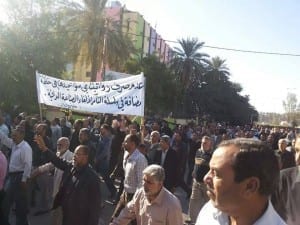
Carrying signs protesting unpaid wages, Iraqi textile workers were among workers from several industries demanding back pay. Credit: Ali Rakeb
The Iraqi government’s offer of partial payment to workers in several industries who have not received salaries for months “is unjust” and should be amended to include all unpaid back pay, says the General Federation of Iraq Trade Unions (GFITU).
The Iraq Council of Ministers last week announced it would pay one month’s wages to workers at plants and factories affiliated with the Ministry of Industry. The companies, which are required to generate sufficient operating revenue to pay 40 percent of workers’ salaries, have repeatedly been unable to do so, and the Ministry of Industry has previously paid workers’ salaries when the companies run out of funds.
The Council of Ministers took the action after thousands of workers in Iraq’s leather, textile and vegetable oil industries protested unpaid wages this month in a series of rallies, most recently in Babylon, where hundreds of workers packed the streets leading to the factory.
Ala’a Sabri, general manager of the association of textile industries in Babylon, said, “the protestors stopped work because they have not been paid since August.”
When vegetable cooking oil company workers in Missan, who also have not been paid since August, took to the streets, they were backed by local government officials who asked the government to pay the workers and renovate Missan’s cooking oil factory, which employs 630 workers.
Clothing company employees in Najaf, who produce men’s suits, pants, jackets, gown’s (dishdasha) and military uniforms, and textile workers in Diwanyya and at the Kut textile factory, also rallied for unpaid wages.
“We are protesting today to request the officials resolve these issues,” Hayder Abdul Amir, one of the protesting employees at Kut, told Al Mada press. “We will continue until they comply with our demands.”
Earlier this month, leather workers, who have not been paid for two months, marched in a large demonstration at two leather companies in Karradha, in central Baghdad. The rally followed one in September, when leather workers protested unpaid wages from July and August.
In an action in support of workers, GFITU members rallied at the Ministry of Interior to demand the government formulate clear policies that guarantee the rights of workers in Iraq’s industrial sector by ensuring workers are paid on time. GFITU also called on the government to take steps to address ongoing factory closures that have put many workers out of a job.
GFITU presented a memo addressed to the Prime Minister Hayder Al Abadi that states: “A large percentage of Iraq’s population, represented by 350,000 employees of the Ministry of Interior and their families, are suffering from hardship and serious neglect.”
The memo listed several demands, including timely wage payment; government transparency when awarding textile and other industry contracts; and creation of a joint government council to address obstacles companies face in staying solvent.
